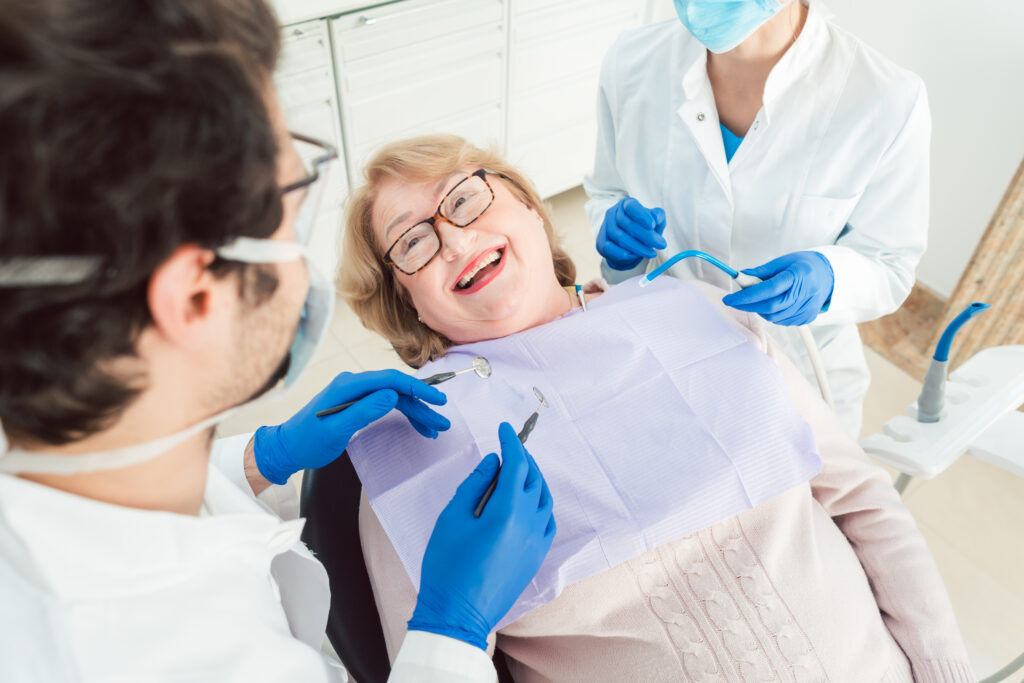
As we journey through life, our bodies change, and so do our dental needs. Just like any other aspect of our well-being, our oral health requires special considerations as we grow older.
In this blog post, we’ll explore the importance of dental care for seniors and give some essential tips to ensure your smile remains happy and healthy throughout your golden years.
#1. Regular Dental Check-Ups
As we age, one of the most important aspects of dental care is regular check-ups at the dentist’s office. Seniors have a greater risk of developing oral health issues such as gum disease, tooth decay, and oral cancer. Regular exams allow the dentist to check for signs of these issues and address them early, preventing them from becoming more serious.
Typically, it’s best to go in for a check-up, but your dentist may suggest a different schedule based on your individual needs.
#2. Maintain Good Oral Hygiene
Good oral hygiene habits are the cornerstone of maintaining a healthy smile, regardless of age; however, for seniors, it becomes even more crucial. As you age, make sure you:
- Brush regularly: Use a soft-bristled toothbrush and fluoride toothpaste to brush your teeth at least twice a day. Consider using an electric toothbrush, which may be easier to handle if you have dexterity issues.
- Floss daily: Flossing removes food particles and plaque trapped between your teeth and along the gumline. If traditional flossing is challenging for you, try using interdental brushes or water flossers.
- Use an antiseptic mouthwash: Antiseptic mouthwash can help get rid of bacteria in your mouth and freshen your breath.
#3. Be Mindful of Diet

Your diet can have a significant impact on your oral health. As you grow older, it’s important to be mindful of what you eat and drink:
- Limit sugary foods and beverages: Sugar is a major contributor to tooth decay, especially if it’s left on your teeth for an extended period of time. Reduce your sugar intake and opt for healthier alternatives.
- Stay hydrated: Dry mouth is a common issue in seniors and can contribute to tooth decay. Drink plenty of water throughout the day to keep your mouth moist and wash away food particles and bacteria.
- Consume calcium-rich foods: Calcium helps you maintain strong teeth and bones. Make sure you’re getting enough calcium in your diet by incorporating leafy greens, dairy products, and fortified foods.
#4. Address Issues Promptly
When dental problems arise, don’t ignore them — even seemingly minor issues like bleeding gums or tooth sensitivity can be signs of more significant problems. Addressing these issues promptly can prevent them from escalating and becoming harder and more costly to treat.
#5. Consider Specialized Dental Care
As you grow older, you may require specialized dental care. Your dentist can help you determine if you could benefit from treatments such as implants, dentures, veneers, periodontics, or orthodontics.
#6. Be Aware of Medication Side Effects
Many seniors take medication to manage various health conditions. If you’re on any medication, be aware of any potential side effects that could affect your oral health. Some medications are known to cause dry mouth, which can increase your risk of certain issues. If you’re concerned about any of these side effects, talk to your dentist to determine whether a change is necessary.
#7. Quit Smoking and Limit Alcohol
Smoking and excessive alcohol consumption are known to stain tooth enamel and have detrimental effects on oral health. To decrease your risk of oral cancer, gum disease, and tooth decay, seek support to quit smoking and limit your alcohol intake.

#8. Stay Active
Maintaining an active lifestyle in your golden years can benefit your oral health. Regular exercise improves circulation throughout the body, including blood flow to your gums, which promotes healthy gum tissue.
#9. Maintain Good Mental Health
Mental health is closely linked to physical health. High stress levels can cause teeth grinding and jaw clenching, which puts your teeth at risk of breaking or becoming worn down. Practice stress-reduction techniques to protect your dental health.
#10. Invest in Preventive Dentistry
Preventative dentistry is your greatest tool for maintaining your oral health as you age. Dental cleanings, sealants, fluoride treatments, and other treatments can help protect your teeth and gums from wear and tear over time.
High-Quality Dental Care for Everyone, From Children to Seniors
At the office of Dr. Eric Felt, we are proud to treat patients of all ages, from young pediatric patients to seniors. Professional exams and cleanings are essential for everyone, regardless of age, so protect your oral health by scheduling an appointment with us today.


